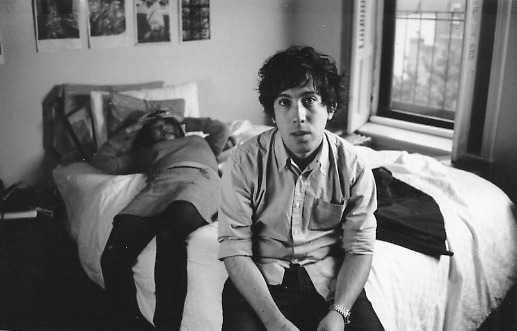
Filmmaker Voyeur
Written by Ann Jackman | Posted by: Anonymous
Andrew Bujalski uses his friends. But in a very good way. The Newton native and Harvard graduate wrote his first film, "Funny Ha Ha" because he thought his friend Kate Dollenmayer could carry a film. He shot the film in Boston in 2002, using mostly friends, a tiny budget, and minimal crew. The film follows Marnie as she navigates through the post-college uncertainties surrounding career, personal direction, and relationships. Good critical reviews and word of mouth have given "Funny Ha Ha" an unusual longevity in the film world, as it still is playing in theaters three years after its first screening. In 2004, Bujalski received the "Someone to Watch" Independent Spirit Award for the film.
In his new film, "Mutual Appreciation," set to screen at the Newport Film Festival in June, Bujalski continues to use his friends. This time, he thought his former roommate, Justin Rice, could carry a film. Shot in New York and using the same production methodology of "Funny Ha Ha," the film takes a wry look at the people and situations a 20-something musician encounters when he moves to New York. It too is generating critical praise in its initial screenings.
Bujalski’s sparsely shot films with large ensemble casts that deliver incredibly naturalistic performances are peepholes into the behavioral intricacies of interpersonal relationships. While more character-driven than plot driven, it is the open and honest look at human interactions, often laid uncomfortably bare, that drive the storylines of Bujalski’s films.
Ann Jackman: When did you know you wanted to go into filmmaking?
Andrew Bujalski: From an early age, as a little kid going to see the commercial cinema of my youth. My mom took me out of school to see "Return of the Jedi," which was very important. We were in the line around the block. And "Rocky III" was a big one for me. Turns out to be a lackluster "Rocky," but I didn’t find that out until later. It was good enough for me at six. I was just really fascinated by movies very early on, and it never occurred to me to do anything else.
AJ: Did you study film in college?
Bujalski: Yeah. They have a great program at Harvard. A lot of people don’t even realize there’s a film program there. There’s a very strong documentary background, and I feel like a lot of what I’m doing comes out of having some of that documentary training and learning to make a film the way a documentarian does — which is you’ve got to know how to run the camera, you’ve got to know how to run the sound. That’s pretty much it. Everything else comes from there.
AJ: So documentaries have had a strong influence on your films?
Bujalski: You have to be careful, because I think if you try too hard to emulate documentaries in fiction, you get a fake documentary, which is just the worst of both worlds, in a way. But a lot of what’s interesting about documentaries can be applied to fiction. You just have to figure out how to apply it. I tend to take a pretty voyeuristic approach to cinema, and documentary, for good and bad, is often the most voyeuristic of cinematic forms. In narrative film, though the stories can be very literary in conception, ultimately it all has to be related through actors, and it’s those human interactions on screen that give something its character.
AJ: How did you come to make your first film?
Bujalski: A year after college, I moved to Austin, Texas with a few friends, including Kate (Dollenmayer) and Justin (Rice). It was when I was there that I wrote "Funny Ha Ha" with Kate in mind for the lead. I came back to Boston to shoot it here. That took a long time to get rolling. There was about six months between when it was finished and when I could get anyone to show it anywhere, and during that downtime was when most of the writing of the first draft of "Mutual Appreciation" happened. And in October, 2003 we shot that film in New York.
AJ: So "Mutual Appreciation" was really shot before "Funny Ha Ha" had received so much critical notice?
Bujalski: Yes and no. "Funny Ha Ha" has had such a long strange slow run. Again, it was a feast or famine thing, in that after I couldn’t get anyone to show it anywhere for six months, the first three screenings were all within a week of each other. It premiered in September, 2002, and I kept thinking it would die out. We’d do a few festivals and then I would say, "Ok, well, that’s the end." And then there would be some other weird little burst. And this happened several times over and over again. It’s still in its theatrical run three years later.
AJ: Have you been surprised by the critical reaction to "Funny Ha Ha"?
Bujalski: Yeah, it’s been crazy, it’s been totally unpredictable. I guess other films have had lifespans like this, but you don’t think of a film as being something that’s going to hang around and grow slowly over three years. It’s supposed to burn and shine much more quickly than that. And I don’t think I’ll ever have that experience again. I have no idea what will happen with "Mutual Appreciation," but it’s hard to imagine it will have the same idiosyncratic lifespan, just because there are more people who are curious now. Whoever it’s going to find, it’ll find them faster.
AJ: Tell me about "Mutual Appreciation."
Bujalski: The germ of "Funny Ha Ha" was me thinking that Kate could carry a movie, and I pretty much pulled the exact same thing with "Mutual Appreciation." The germ was that my old friend Justin Rice could carry a movie. What he and Kate have in common is great charisma, although a totally different brand of charisma. Justin is in a terrific band called Bishop Allen, so starting with the idea of him carrying the film and knowing that I could also exploit his musicianship, I crafted the story about a musician.
Although I think some of the themes and plot mechanics mirror "Funny Ha Ha" — they’re both very small films, very low on plot, and have a lot of people hanging out — I think the films operate in very different ways, and I think tonally they’re very different from each other, although that’s ultimately not for me to judge. But I felt going into it that we were working in a really different vein, even though the methodology was the same as well — non-professional actors, a very small crew. But I think within certain limits you set for yourself and your resources set for you, you can still go in quite a different direction.
AJ: What do you mean tonally different?
Bujalski: Well, it’s just started to go out in the world to four or five festivals now, and I’m still learning how people are reacting to it. My impression is that the real cineastes prefer the new film, but the people who responded to the youthful naïveté and those aspects of "Funny Ha Ha" which were so contrary to current indie fashion maybe prefer that. Not that the new film follows indie fashion. Some audiences see it as a warmer film than "Funny Ha Ha," and others see it as darker. I definitely felt a darkness in it.
AJ: Compare your experience with "Mutual Appreciation" to that of "Funny Ha Ha."
Bujalski: ["Mutual Appreciation"] felt more difficult in every way. On "Funny Ha Ha," in some ways, we were protected by a bubble of naiveté. And we were blessed by the fact that we had no expectation that anyone would ever see it. When it came to the new film, we had lost some of the naiveté, plus we knew that someone would probably see it, which actually made it a little more stressful. With "Mutual Appreciation," the subject matter felt difficult and it was technically more difficult. The post took twice as long. And the lead was male instead of female, and closer to my actual life and psyche.
AJ: Were there any lessons that you learned from "Funny Ha Ha" that you applied to your new film?
Bujalski: Yeah, but you can really trip yourself up trying to apply those lessons, because each shoot is unique. You still have to learn from scratch, because on each new film you encounter new problems that need different solutions.
AJ: Why did you choose to set your new film in New York rather than Boston?
Bujalski: It was really a pragmatic choice, because Justin lives in New York, and Ethan Vogt, who’s the producer, also lives there, and most of the key players were there. New York does actually get mentioned by name a few times, but it’s not a New York film in the sense of making a grand statement about the place.
AJ: You shot both films in 16mm. Why this format instead of video?
Bujalski: I adore it. I love it. It feels great. It looks beautiful. I’ve never shot 35, so I don’t have personal experience with it to talk about it, but I’ve spent a lot of time with 16mm and am just enamored with it. Video’s changing every day, but going into these two films I felt like it just is a different medium and it talks in a different way than film does. And these were things that were conceived for a kind of language of film, and I wouldn’t know how to tell these stories on video. I think the films would have been really different if they’d been shot on video.
AJ: Why did you choose to shoot "Mutual Appreciation" in black and white?
Bujalski: I felt like the new film is a weird comedy and thought black and white was funny. I know, for better or worse, it reminds people there are only so many films that have been done in black and white in the last 30 years. And I didn’t do it to reference those films, but I do think that there is a deadpan quality to it, something that you can see in those films and you can see in my films.
AJ: As writer, director, and editor, how do you approach the film differently from each role?
Bujalski: Well, the thing about making a film where I’m there at every step of the way is that I constantly feel like at every stage I’m trying to make up for the mistakes of the previous stage. So when you’re directing, the actors help you discover what a bad writer you are, but then you say, "Ok, no one will ever find out because we’ll just fix it right here." Then when you’re editing, you say, "Oh my God, how could I have done this?" And then you throw that out.
AJ: Do you prefer one role over the other?
Bujalski: Directing is obviously bracketed by writing and editing, which are intellectual solitary pursuits, depending on what the constraints are. Writing and editing are similar. Theoretically, you have all the time in the world, although you never actually do. But in directing, you’re in the middle of that and you’d like it to be intellectual, but in practice it’s just athletic. It’s just about trying to survive the day. So it’s an interesting process. Certainly you’re working all of your muscles.
AJ: You also act in both films.
Bujalski: Acting is not something I ever really pursued, but when you can’t afford to pay people, it’s helpful to eliminate the need for one more cast/crewmember by wearing multiple hats. But beyond that, I felt like I wanted to try to rise to those challenges. Acting in one’s own script is a peculiar thing, as of course one feels connected to the printed word in a way the other actors don’t. I don’t know if I could act in something that I hadn’t written, because I write the same way that I talk. So I’m in awe of all the other actors in the films. Most of them have as little experience and interest in acting as I do, but they have a much harder job. That said, if I ever get to do a third film, I’d very much like not to act in it.
AJ: How do you manage to get such naturalistic performances and avoid the wooden acting that you often see with non-professionals?
Bujalski: Going into these films, the prime objective was the end performances, because what I’ve seen happen in so many student films and low budget movies — and I’ve actually heard people say this — is, well, we couldn’t quite get the performances, but everything else came together really good. But when you watch the film, the performance is the thing that you’re watching, and the fact that your gaffer was happy and your sound man was happy doesn’t really matter to the guy who’s watching the film. You’re much better off watching a film with great performances where maybe the sound is a little muffled or something.
As a director, all I’m trying to do is create an environment where that can happen. I think casting is everything. Not just casting the actors, but also having as small a crew as possible and having that crew consist of people who are going to contribute to this loose environment. And then trying to stay attuned to whatever’s actually happening on set, as opposed to what you might wish were happening.
AJ: Do you have extensive rehearsals?
Bujalski: Because we all are non-pros and we don’t have a common language of craft, everyone has their own approach and their own feeling and their own comfort level with how they want to do it. And it’s just a matter of trying to figure out where and how people are at their best and then about doing whatever we can to help them, which is usually just to stay out of the way. I’m fascinated with how performances come together. When you work with non-professional actors, you get something unique. I don’t think these films would be as good with professionals in them.
AJ: A lot of reviews compare your films to those of John Cassevetes and Mike Leigh. Were they conscious influences while you were filming?
Bujalski: I certainly love both of those filmmakers. And anyone else I’m compared to, I’m probably a fan of. I’ve certainly learned a lot and stolen a lot from the films, but I think I’ve also learned a lot and stolen a lot from a lot of other films, and I think ultimately all of that is not necessarily incorrect, but I wish that it weren’t the focus of every review, because I think it’s reductive.
AJ: What attracts you to do more character-driven rather than plot-driven films?
Bujalski: It’s something to do with the type of cinema I react to. I come to cinema sort of as a voyeur looking into other people’s lives. I sometimes worry that it’s a mild form of mental illness, looking at others’ lives without them being able to look back at you. Movies are a way of relating to the world where you can watch and learn endlessly , but are never really asked to give anything of yourself.
AJ: What are you working on now?
Bujalski: Between everything that’s happening with "Funny Ha Ha" and finishing "Mutual Appreciation," I’ve been so busy I haven’t had time to do anything else. "Mutual Appreciation" is going around to festivals and screenings right now. Both these films have exceeded my expectations of success. But I definitely can’t keep working the way I’ve been working. "Funny Ha Ha" was all private money — every dime I had plus several additional dimes, mostly from people I’m related to. The second film was similarly funded. On both films, all of the equipment was lent to us, the vast majority of cast and crew worked for free. Both films were shot in 20 days. If I want to be able to make a third film, something’s going to have to change. I can’t stay the same course. But if I could figure out a way to do it, I’d keep making 20-day films every two years.
'Mutual Appreciation' will screen at the Newport Film Festival on June 9 at 8pm and June 10 at 9pm at the Opera House. The website for the film is www.mutualappreciation.com. For more information about the Newport Film Festival, visit http://www.newportfilmfestival.com.











